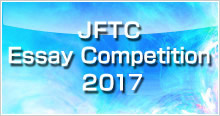Remarks by Selection Committee Chair, Dr. Iwao NAKATANI
For the JFTC Essay Competition 2009, we received a total of 146 essays from all over the world. As a result of rigorous examinations, we have chosen one essay to receive the Grand Prize and two essays to receive the Prize for Excellence. The highly international character of this competition was clear again this year, with 64 percent of the essays submitted in English. Moreover, the judges shared the impression that the quality of the submitted papers is improving year by year. The judges welcome this development, and have high expectations for future that this trend will continue.
The theme of this year's competition was "How Should Global Capitalism be Corrected – Japan's Role and Mission." Many of the essays expressed concerns about the future of the global capitalism because there is an apparent decline of ethical and moral standard which is a basis of a sound capitalist economy. It is also pointed out by many authors that the Japanese economic system is characterized as putting more value on mutual trust and long-term business relations, which could make up for the shortcomings of the Anglo-Saxon styled capitalism.
Many of those essays have developed very interesting arguments, and all of the Selection Committee members enjoyed a great deal reading them.
The Grand Prize was awarded to the following essay.
Kiyoshi Miura:
“The Correction of Global Capitalism and Japan's Mission – Toward Overcoming the Two Crises Caused by the Economic Crises”
This essay suggests two basic problems of the present-day capitalism. One is "a loss of the sense of safety and security in society caused by the recent development of globalization". Another is "the drastic shift within the world economy towards the newly industrializing economies and the emergence of the idea of state capitalism". Miura develops a restrained yet persuasive argument for solving these problems emphasizing the role of Japan. He suggests that "Japan should continue structural reforms that they themselves see as necessary, and present an attractive model of capitalism to the rest of the world".
The Prize for Excellence was awarded to the following two essays.
Michal Olewnik:
“Reconstruction of Japan: prescription to transcend a downsized Japan”
Olewnik holds that the experience of Japanese capitalism, for example, in emphasizing altruistic aspects and long-term commitments, can be useful for restoring Anglo-Saxon based global financial capitalism. Olewnik is an exchange student from Poland. His essay shows abundant knowledge regarding Japan and an exceptionally high level of intellect.
Hajime Motegi:
“A Prescription for Global Capitalism – Can Japan Revive Economic Chivalry”
Motegi notes the importance of public spirit, as in the "economic chivalry" advocated by Alfred Marshall and the "noble spirit in business" of Eiichi Shibusawa, as a prescription for rectifying global capitalism, and discusses its possibilities. He reaches the very interesting conclusion that the key to reviving global capitalism lies not in "institutionalized economics" but in changing consciousness of all the market participants.

